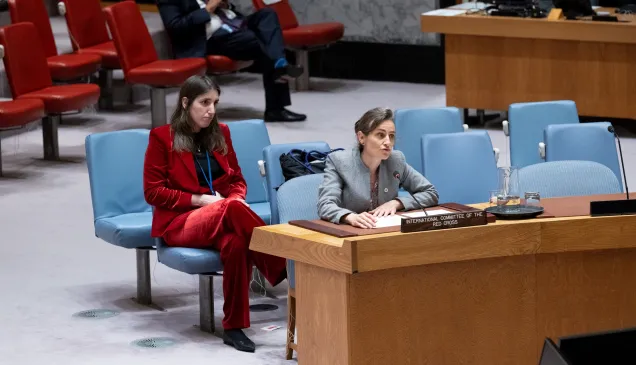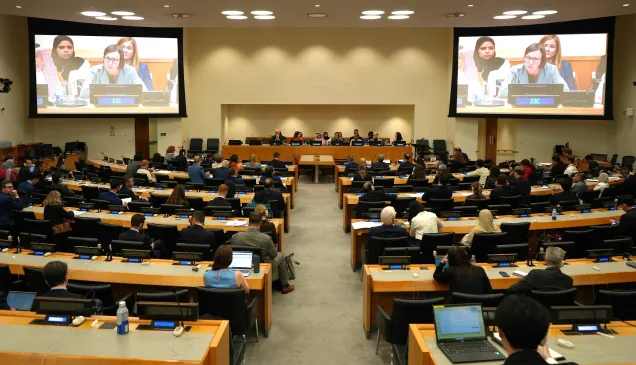Speech by ICRC president: Global compact for responsibility sharing for refugees, respect for international law
Speech by Peter Maurer, president of the International Committee of the Red Cross, on "Global compact for responsibility sharing for refugees, respect for international law" at the UN Summit for Refugees and Migrants
Ladies and gentlemen, dear colleagues,
My mother tongue is German. Philosophers, sociologists and historians have written about the notion of 'Heimat', the German word signifying a deep sense of spatial, social, emotional and cultural belonging that includes safety and security.
We are here today to speak about people who have lost this security, lost their home, lost almost everything.
I say people because I am not talking about categories, flows or movements. 65 million people worldwide are displaced by violence. IDPs, migrants, refugees, asylum seekers, stateless people; these are all individuals who are living through a traumatising human experience. They deserve fair and humane treatment. Not as a case or a number, but as persons.
One such person whom I met recently, Aisha, saw her husband shot in an attack on their village. Fleeing on foot, she lost one of her seven children. She is one of thousands of widows who don't know if they can ever return home.
She flees from fighting, from immediate threats to her life. She flees because she and her children just cannot survive anymore, cut off from food and water supplies, without electricity or healthcare. And she flees because life is about more than mere survival, it's a question of dignity. There are no jobs for her, no schools for her children, and no life to be built.
Displacement is often the consequence of fear, but the arrival of migrants, including refugees and asylum seekers, also causes fear in host States. There is no easy way to dispel this fear. But if ignored, or - worse – whipped up into hatred, it will trigger a vicious cycle of enmity, exclusion and destruction.
Hence, the critical importance of international legal standards that govern the treatment and protection of migrants and refugees. These laws were created to protect people, to foster inclusion, and not to be distorted to legitimize exclusion. They must be interpreted as such, in order to provide a legitimate and sustainable foundation for the policies that will derive from the Comprehensive Refugee Response Framework.
Ladies and gentlemen, dear colleagues,
As President of the ICRC, my role is to draw your attention to international humanitarian law and its relevance in addressing the root causes of large movements of migrants. The brutal reality of warfare combined with repeated violations of international humanitarian law create unacceptable living conditions. Indiscriminate attacks, targeted attacks on civilian infrastructure and hospitals, siege warfare depriving the population of the means to survive, continue to occur in too many theatres of conflict around the world.
At the heart of all international humanitarian law lies the protection of civilians, of detainees, of the wounded and sick, and of others not participating in hostilities. It is this shared humanity that gives IHL its relevance, its legitimacy, and its universal sense.
I call on you to respect the law, to ensure respect for the law, to keep the balance in a world where many different powers pull in all different directions. Lawlessness produces displacement and will never allow for safe return.
At the International Committee of the Red Cross, together with our Red Cross and Red Crescent partners, we see the suffering first-hand, we witness the personal human tragedies, and we see the scale of destruction from which people flee. We know that leaving your home in such conditions is never a choice.
Remember there is an individual tragedy, potentially long-term psychological suffering, behind every statistic. The response must be individualized, too, and I recognise that this can be a challenge but the alternative is not in line with the principle of humanity.
Bad policies will create additional suffering. Therefore, steer clear of arbitrary detention and inadequate fast-track procedures. Do not allow inhumane conditions and family separations. There is no quick fix to build a new life in a new place.
And there is no other way than to invest money and effort. It's a humanitarian imperative – and socially and economically productive - to give people the opportunity to build new lives, to take charge of their own lives, to work and raise their children in dignity.
To give every person a chance to build a new 'Heimat', temporary or permanent.
Thank you.



